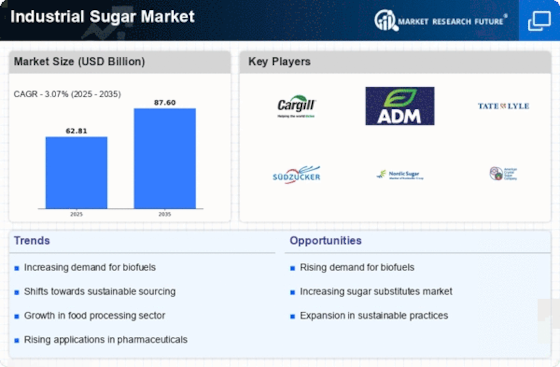Top Industry Leaders in the Industrial Sugar Market

The industrial sugar market plays a vital role in various industries, ranging from food and beverages to pharmaceuticals and biofuels. Key players in this sector strategically position themselves to navigate the complexities of the sugar industry and capitalize on diverse applications of industrial sugar. This analysis provides insights into the key players, strategies adopted, factors influencing market share, emerging companies, industry trends, overall competitive scenario, and a recent development in 2023.
Key Players:
British Sugar
Rogers Sugar Inc.
Imperial Sugar Company
Guangxi Funan East Asia Sugar Co., Ltd,
Nordzucker Gmbh & Co KG
Cargill Incorporated
Archer Daniel Midland
Raizen SA
Sudzucker AG
Tereos
Strategies Adopted:
Market Share Analysis:
New & Emerging Companies:
Industry Trends:
Recent industry developments highlight a growing trend towards technological innovation in sugar processing. Major players are investing in advanced technologies, such as automation and data analytics, to enhance efficiency in sugar production, reduce costs, and minimize environmental impact.
In terms of investment trends, companies are exploring opportunities in the growing demand for alternative and specialty sugars. Investments in research and development focus on producing innovative sugar products, including organic, non-GMO, and sustainably sourced sugars, aligning with evolving consumer preferences.
Competitive Scenario:
the industrial sugar market is dynamic, with established players adapting to emerging trends and new entrants exploring innovative solutions. The focus on diversification, global expansion, sustainable practices, and technological advancements remains central to the overall competitive scenario.
Recent Development
The industrial sugar market was the increased emphasis on traceability and transparency in the supply chain. Major players introduced initiatives to enhance traceability, providing customers and end-users with detailed information about the sourcing, processing, and distribution of industrial sugar. This development aligns with the industry's recognition of the importance of transparency in building trust with customers and meeting the growing demand for clear information about the origin of food and industrial ingredients. Companies invested in technologies such as blockchain and digital tracking systems to implement robust traceability measures, contributing to greater accountability and sustainability in the industrial sugar supply chain. This shift towards increased transparency reflects the industry's commitment to meeting evolving consumer expectations and fostering a more transparent and accountable sugar supply chain.











